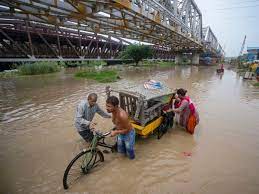Low-lying areas flooded as Yamuna continues to rise, thousands moved to safer place.
The Yamuna River's rising water levels have led to severe flooding in low-lying areas, prompting authorities to evacuate thousands of people to safer locations. The relentless increase in the river's water levels has posed a significant threat to human lives, homes, and infrastructure.
As the monsoon season intensifies and heavy rains pour into the Yamuna basin, the river swells beyond its normal capacity. The excessive inflow of water, combined with inadequate drainage systems and encroachments along the riverbanks, exacerbates the flooding situation in nearby areas. Low-lying regions, including residential areas, agricultural fields, and small settlements, are particularly vulnerable to the rising waters.
To ensure the safety and well-being of those living in flood-prone areas, authorities have taken proactive measures to evacuate residents to temporary relief camps or designated safer zones. These evacuation efforts involve coordination between government agencies, disaster management teams, and local authorities to ensure a swift and organized response. Rescue operations, aided by boats and other means of transportation, are conducted to reach and evacuate those in distress.
The impact of the flooding extends beyond immediate displacement. It often results in damage to infrastructure, including roads, bridges, and electrical networks, causing further disruption to the affected communities. Additionally, the flooding poses health risks, as contaminated water and unsanitary conditions can lead to the outbreak of waterborne diseases and other health concerns.
Efforts are underway to provide relief and support to those affected by the flooding. Temporary shelters are set up to accommodate displaced individuals and families, providing them with basic amenities such as food, clean water, healthcare, and sanitation facilities. Aid organizations and government agencies work together to provide essential supplies and medical assistance to the affected population.
Long-term solutions to mitigate the impact of Yamuna River flooding include the construction and improvement of flood control infrastructure, such as embankments and reservoirs, along with efficient drainage systems. Strengthening early warning systems and community preparedness can also help reduce the risk to vulnerable populations.
Addressing the root causes of flooding, such as unregulated construction in flood-prone areas and encroachments along the riverbanks, is crucial to prevent future disasters. Integrated water resource management strategies, including sustainable land-use practices, riverbank restoration, and conservation measures, are essential to maintain the river's natural flow and mitigate the impact of floods.
The challenges posed by the rising waters of the Yamuna River demand a comprehensive and collaborative approach. By investing in infrastructure, disaster preparedness, and sustainable development practices, we can reduce the vulnerability of communities and ensure their safety in the face of such natural disasters.
#delhi #naturaldisasters #yamunariver #floods #yamunawater #waterlevel #delhinews #yamunafloodplanis #lowaresa #facingprblems #flooding #yamunariverflooding #prayfordelhi #redalet #heavyrain #rain

.jpg)

0 Comments